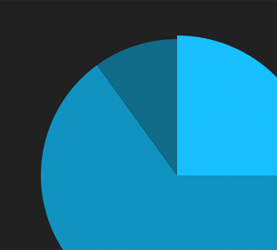Canvas drawing made easy
oCanvas is a JavaScript library intended to make development with HTML5 Canvas easier. Instead of working with pixels, you work with objects. It’s very straightforward and easy to get started with. Please have a look at the examples to see just how easy it is.
View demos & examples
Download oCanvas
Current release: 2.10.1
Production 21 kB minified & gzippedDevelopment 192 kB full source
For the complete source separated into modules, check out the GitHub page.
Example
This demo shows how you can create a simple satellite system. It will generate seven satellites, which themselves has a satellite, and that satellite also has a satellite. That will demonstrate the object model in oCanvas, where you can add objects as children to other objects and create a sort of display tree. Objects inside other objects will be transformed with its parents. The demo also uses the origin property of objects, to move the point which the object is rotating around. Click anywhere to start the demo.
View Examplevar canvas = oCanvas.create({
canvas: "#canvas",
background: "#222",
fps: 60
});
// Center planet
var center = canvas.display.ellipse({
x: canvas.width / 2, y: canvas.height / 2,
radius: canvas.width / 20,
fill: "#fff"
}).add();
// Prototype objects that will be used to instantiate the others
var satelliteProto = canvas.display.ellipse({ fill: "#eee" });
var pathProto = canvas.display.ellipse({ stroke: "1px #999" });
// Set up data
var satellites = [], depth = 3;
var satelliteColors = ["#107B99", "#5F92C0", "#c7509f"];
var pathColors = ["#666", "#107B99", "#5F92C0"];
// Create seven satellites and paths. Definition is further down.
for (var i = 0, l = 7; i < l; i++) {
createSatellite({
parent: center, depth: 1,
distance: (i + 1) * canvas.width / 6,
radius: canvas.width / 100,
speed: 1
});
}
// Set up a tick function that will move all satellites each frame
canvas.setLoop(function () {
for (var i = 0, l = satellites.length; i < l; i++) {
satellites[i].rotation += satellites[i].speed;
}
});
// Definition for a satellite and its corresponding path
function createSatellite (options) {
// Create the path that the satellite will follow
var path = pathProto.clone({
radius: options.distance,
x: options.x || 0, y: options.y || 0,
strokeColor: pathColors[options.depth - 1]
});
options.parent.addChild(path);
// Create a new satellite
var satellite = satelliteProto.clone({
origin: {
x: 0,
y: options.distance * (Math.round(Math.random()) ? 1 : -1)
},
speed: Math.random() * (2 * Math.random() - 0.5) + 0.5,
radius: options.radius,
x: options.x || 0, y: options.y || 0,
fill: satelliteColors[options.depth - 1],
rotation: Math.random() * 360
});
options.parent.addChild(satellite);
satellites.push(satellite);
// Create another satellite that will circle around this satellite
if (options.depth < depth) {
createSatellite({
parent: satellite, depth: options.depth + 1,
distance: options.radius * 7,
radius: options.radius / 1.5,
x: satellite.origin.x * -1, y: satellite.origin.y * -1,
speed: 10
});
}
}